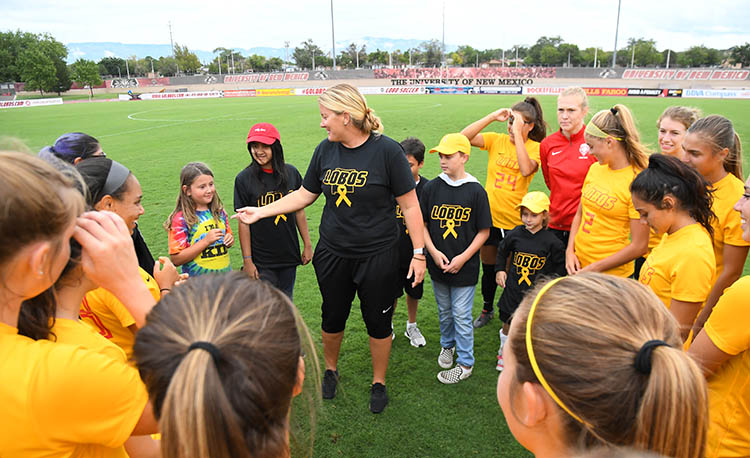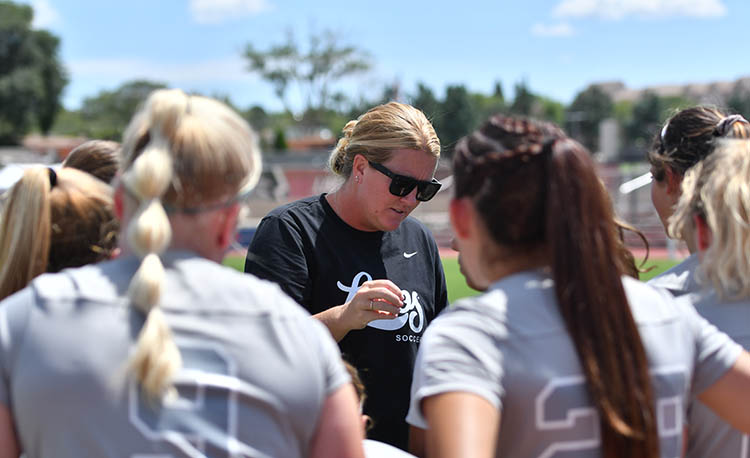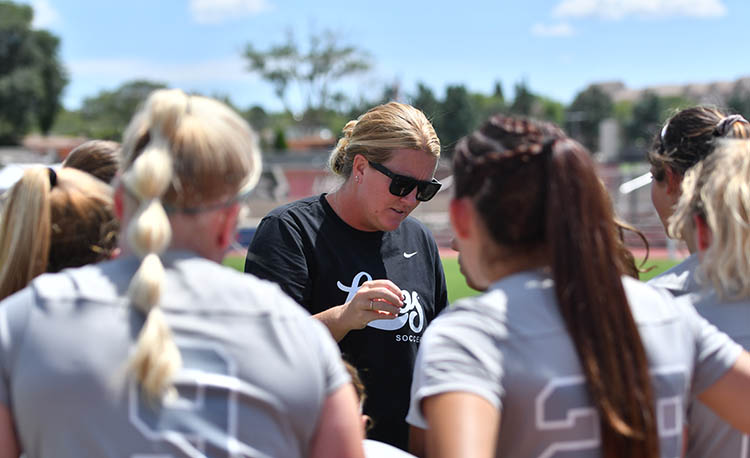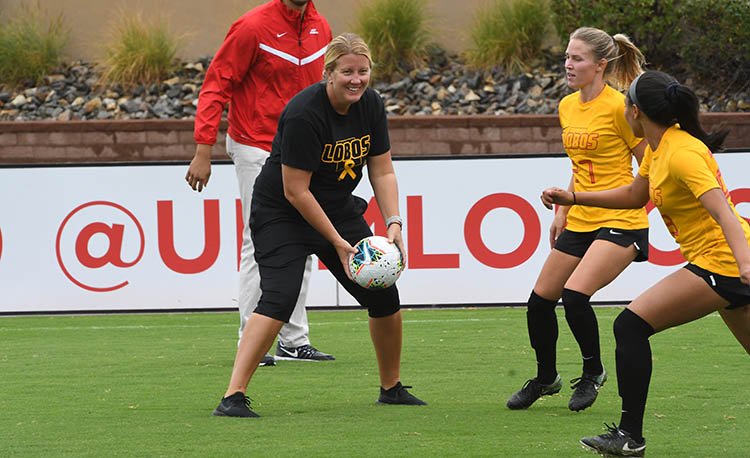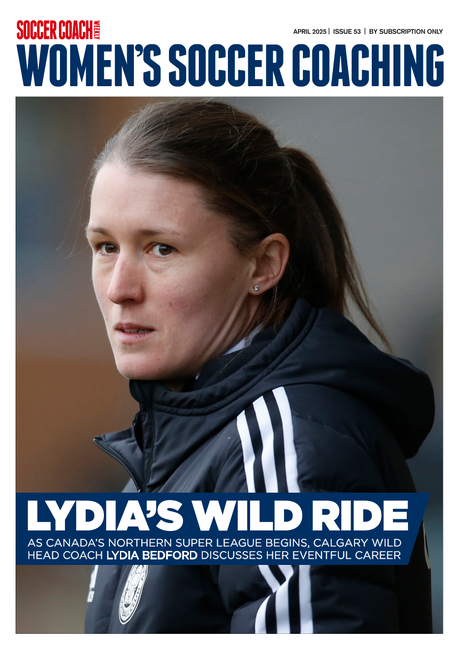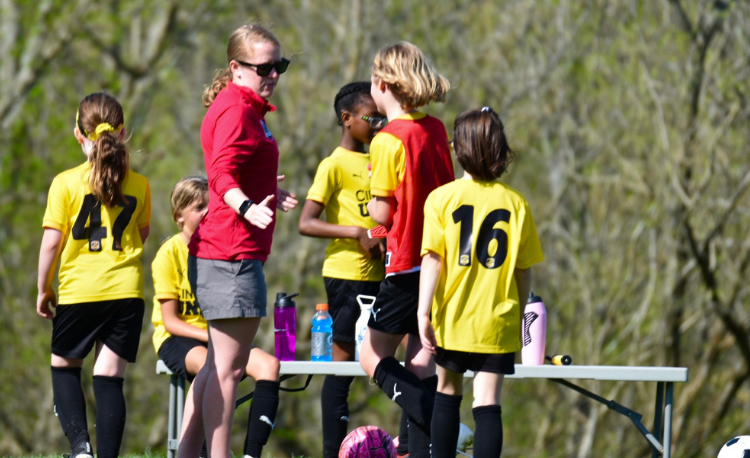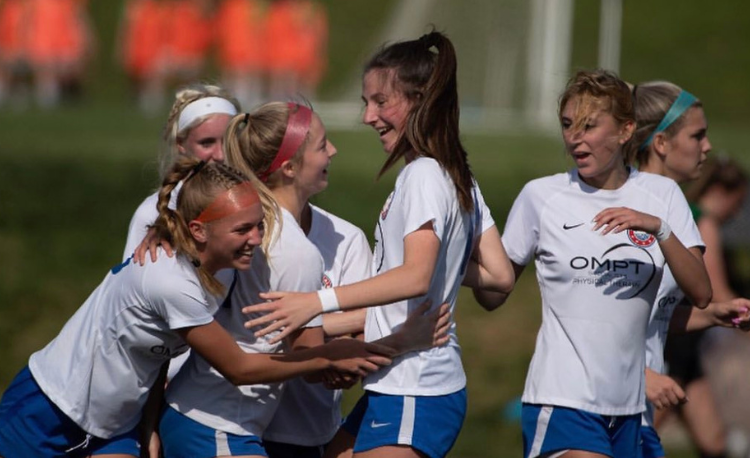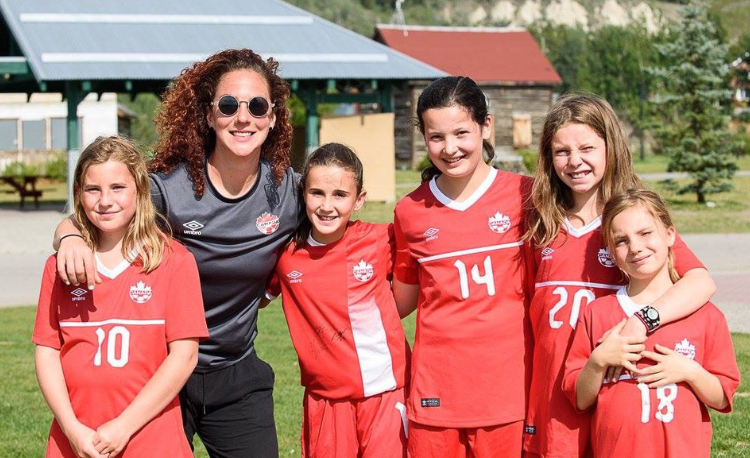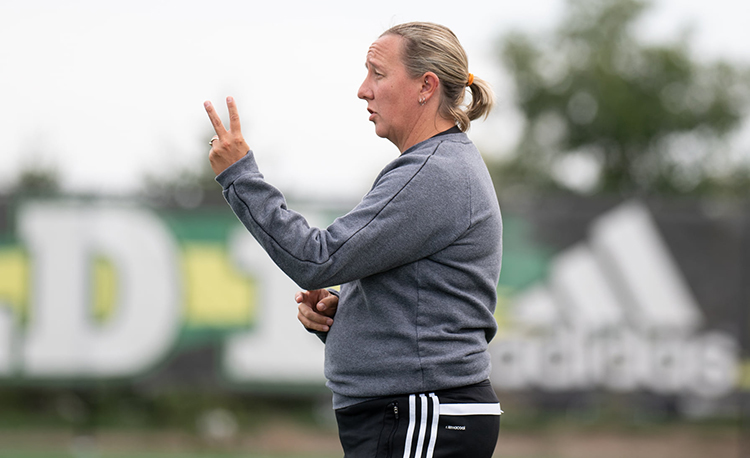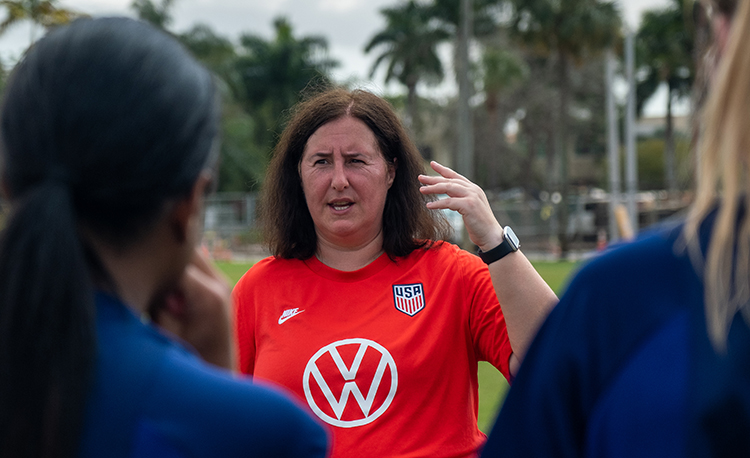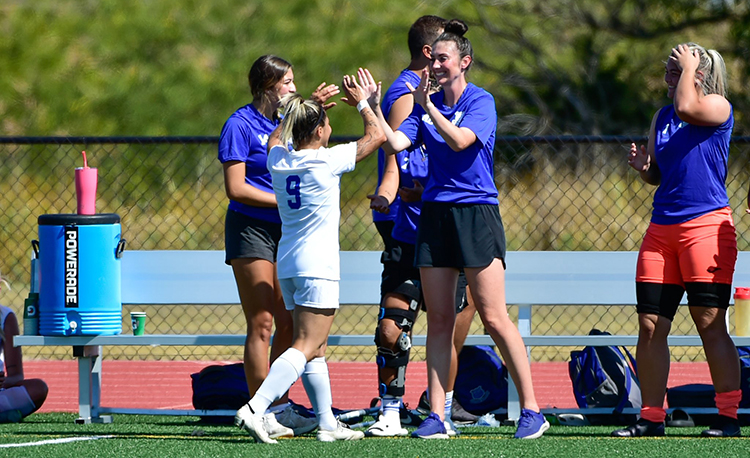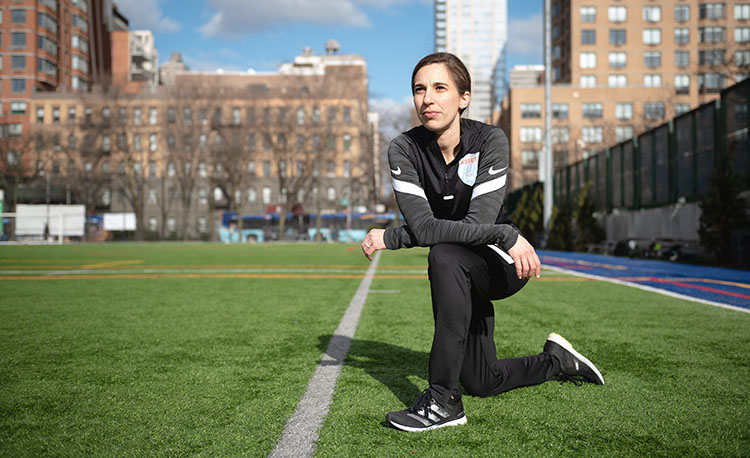You are viewing
1 of your 3 free articles
‘If you need us, we’ll show up’
It’s a pledge to players that has served University of New Mexico head coach HEATHER DYCHE well. STEPH FAIRBAIRN discovers the keys to her success
Heather Dyche says the question she gets asked most is: ‘What advice would you give coaches looking to carve their own career path in soccer?’.
You need only look at Dyche’s packed Twitter bio to work out why.
She is head coach of the University of New Mexico’s (UNM) women’s team, on the technical staff of New Mexico United, a FIFA technical expert, the only female coach on Concacaf’s education board, and founder and head coach of the LEAD Soccer Academy.
And in January this year, she was elected to United Soccer Coaches’ board of directors, on which she will serve a six-year term.
Her hectic days follow a pattern, to a degree - training at UNM in the morning; player meetings, video reviews, and preparing for the next trip in the afternoon; and teaching courses for US Soccer, Concacaf, Fifa and other bodies in the evenings.
The string which ties these varied roles together is Dyche’s approach: people-first, rather than player-first. She and her staff at UNM have been talking a lot about what this means in practise.
“I think the number one thing is that our players feel cared about and know we will show up,” Dyche told Women’s Soccer Coaching.
“I believe in candour. I think it is important players know where they stand...”
“If you need us, we will be there. We’ll show up, whatever it is. That’s outside of the field, and hopefully it is the remainder of your relationship with them as things go forward.
“You have to show up. You have to be there when people need you. You can’t just be there when times are good.
“I also believe in candour; I think it is very important that players know where they stand and know what they need to do to get better. And they know we will be there to help them.
“Whether you are a 90-minute player, or you don’t see the field, if you need our help we will be available.
“Hopefully that leads to an environment of self-driven action, instead of feeling that you are helpless to get to your goals.
“Another big thing for me is fun. This is a game - you are supposed to enjoy it.
“It is okay to do things that seem silly or that players enjoy. The people part of it is really what is going to keep you in the game.”
For Dyche, adopting this approach is something that requires regular review.
She adds: “When you are coaching, you can get very focused on results, on tactics, on recruiting and on a lot of other things you think are going to be what allow you to be successful.
“In some ways it will be; you do have to win games, you do have to tactically be aware of what is going on and make sure you are providing good information.
“But, at the end of the day, coaching is a people job. It is an investment in people.”
Investing in people is exactly what Dyche did when she set up the LEAD (Leadership and Empowerment through Athletic Development) Soccer Academy.
She said: “If you talk to young women that are in puberty, just about to start it or are just finishing it, they really struggle with confidence. They struggle with the ability to speak their voice without coming across as demeaning or rude.
“They have a hard time taking feedback sometimes. They have a hard time wanting to stand out, being confident in what they do.
“That is silly to me. I think there should be no difference in gender for your ability to recognize your strengths.
“So we created LEAD to provide specific feedback for young women and also to teach them some life habits that I think can sometimes go unseen.
“That includes making eye contact when someone is speaking, shaking hands, saying hello, being confident to speak in front of a group, being able to say what you are good at, which a lot of young women cannot do.
“We created LEAD to try and create a safe environment for women to feel the opportunity to improve on all of those, with soccer being the avenue to do so.”
Soccer was certainly the avenue to success for the 28 players on Dyche’s last UNM roster, as the head coach, appointed in 2015, proved that a people-centred culture and results can go hand in hand.
In 2020, UNM won its first outright Mountain West title in almost a decade as Dyche oversaw a 10-2-1 record for the season. She was awarded Mountain West’s Coach of the Year for her efforts, but Dyche prefers the credit to go to her players.
They are all pretty incredible young women,” she said. “They are getting these great degrees and finding themselves and doing these different things.
“If you can help in that process in any way, that is a whole lot more rewarding than it is just to win games.”
The fact is, Dyche has done both - created a winning culture that puts the team’s players at its heart, the sweet spot many head coaches are searching for.
“Discipline and fun aren’t opposites. I honestly think they are the same...”
But what is the secret? And can you run a tight ship, with everyone rowing in the same direction, while ensuring players do so with a smile on their face?
“I don’t think that discipline and fun are opposites. I honestly think they are the same,” Dyche said.
“I think if you are in an environment where you know now is our time to work, and now is our time to play, then you can work hard and play hard. Shouldn’t that be why we are doing this?
“We are all hopeful that if you can get all the pieces right, it will lead to wins, because wins can create a more positive environment because people feel better about themselves.
Related Files
‘ANYTHING THAT IS TRANSFERABLE FROM WATCHING ANYONE ELSE, I’M GOING TO TAKE’ — HEATHER ON ‘STEALING’ FROM OTHERS
“I think coaching is transferable, because it is the ability to make sure that the information you have is being received and actually implemented.
“When you watch people that are really good at delivering their information, and then checking to see if their athletes understand it, I find that process fascinating.
“It is kind of irrelevant what sport you are teaching, it is whether you can get your message across.
“There are different ways of doing that. You sometimes see a hierarchical approach of: ‘You are going to do what I say and you are going to get it done.’
That can be effective because it brings immediate results, but I always question with that type of teaching: is it permanent or is it just a reaction to fear?
“Then you see coaches that are very data-driven. I think sometimes that can be paralysis by analysis for players. it is too much in their heads.
“You see coaches that are quiet and just talking in the ear, and you wonder if the whole message is being received by the team.
“It is very difficult to be a good coach or a good teacher. Anything I can steal, or that is transferable from watching anyone else do it, I’m going to take.”
DYCHE ON MENTORING: ‘I DON’T THINK THERE IS A RIGHT WAY TO COACH. SHARING IDEAS ULTIMATELY LEADS TO BETTER COACHES’
Heather Dyche’s influence is spreading further via SheChampions, a US Soccer Coaching Education initiative which pairs female USSF Pro and A license candidates with senior mentors.
Heather was a mentor to two coaches through the initiative.
She said: “I really enjoy listening to how different people interpret soccer, how different people want to teach it and the passion behind it.
“I don’t think there is a right way to coach. I think the sharing of ideas ultimately leads to better coaches on both sides.
“I have had some pretty incredible mentors in my career but I never asked them to officially be my mentor. It was just people that were willing to look out for you and believe in you.
“The two women that I mentored through SheChampions were both pretty incredible coaches that I learned a ton from too. It’s just check ins: how are you doing with this? How can I help?
“I think often people think that mentorship has to be a hierarchy, but I don’t think that necessarily needs to be the truth. I think mentorship is really, if I have ideas or experiences that you don’t, how can I help share those with you and how can I help you while you’re going through them to not make it so rocky or bumpy.
“I don’t think mentorship needs to be formal. Mostly, I think it’s the willingness to reach out and say, I don’t know, which can be hard as a coach, and find people that are willing to help walk you through it. It’s massively valuable.”
“We all question things less when you get a result.” It is easy to say, of course, when winning has invariably become a habit. But if form takes a dip, Dyche says you have to stay firm to your beliefs - particularly the idea that working hard and playing hard is to be enjoyed.
“I do think that if you are going to have any longevity in coaching, you have to be process driven,” she said.
“You can do everything right and still lose a game, especially in soccer, so finding joy in the process is an important piece.
“I think sometimes we get so driven by some other things that the stress of it weighs on you to a point where you stop enjoying it. And that is crazy.
“I get to wake up in the morning, put on sweats and go out to a beautiful field and coach a game I love, to a bunch of young women that I think are amazing, with a staff that I get to pick.
“That is really cool. And if you lose sight of that, that is a shame.”
Returning to the beginning, what is Dyche’s response to her most asked question? What does she say to coaches looking to carve out their own career path? Firstly, she says - work hard.
“I have tried to invest wholeheartedly in myself at being good at whatever it is that I’m working on doing,” Dyche said.
“So, if it’s coach education, I’m studying teaching, I’m studying adult learners, I’m really diving into the curriculum and making sure that I feel very comfortable with it.
“Make sure you are educated and that you put the work in, because doors will open for you. But you need to make sure that when those doors open, and you walk through, you’re ready.”
Dyche’s next bit of advice is to always be honest and sincere.
“Don’t pretend you know what you don’t know,” she said.
“I think that sounds a whole lot easier than it is.
“When you are hired as a coach, you are supposed to know, you are supposed to be in charge, you are supposed to have all these different ideas, and make decisions.
“Sometimes that can be really overwhelming and a heavy burden to bear. I think it’s just fine to say ‘I don’t know what I’m doing here, I need help. I’m not performing at the level I would like to at this, I need help’. That’s exactly what you want your players to do.
“I think being able to emulate that is an important piece for them, to see that you need to be a lifelong learner.
“And you need to have the humility to ask and know that other people are doing it at a higher level and a better level or just a different way.
“A lot of people are afraid to say they don’t know or to ask for help. That’s an important piece in coaching: the humility to ask for help.”
Newsletter Sign Up
Newsletter Sign Up
Discover the simple way to become a more effective, more successful soccer coach
In a recent survey 89% of subscribers said Women's Soccer Coaching makes them more confident, 91% said Women's Soccer Coaching makes them a more effective coach and 93% said Women's Soccer Coaching makes them more inspired.
*includes 3 coaching manuals
Get Inspired
All the latest techniques and approaches
Women's Soccer Coaching offers proven and easy to use soccer drills, coaching sessions, practice plans, small-sided games, warm-ups, training tips and advice.
We've been at the cutting edge of soccer coaching since we launched Soccer Coach Weekly in 2007, creating resources for the grassroots youth coach, following best practice from around the world and insights from the professional game.
